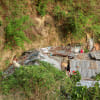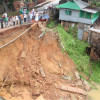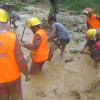Forsaken, they live in danger

Eleven years into the massive landslide in Chittagong that left 127 dead, the government is yet to rehabilitate those still vulnerable to the disaster.
After the incident of June 11, 2007, the government formed a high-powered committee to probe the disaster. In its report, the committee suggested permanently relocating the people living at the foot of the hills.
But no relocation has happened till date.
According to the Chittagong District Administration, there are 29 hills that host over 663 families.
Abdul Mannan, divisional commissioner of Chittagong division and also president of Hill Management Committee, told The Daily Star last month they were yet to implement the recommendations.
He said they recently sent a letter to the principal secretary to the Prime Minister's Office regarding the relocation and rehabilitation.
Chittagong City Corporation (CCC) would be tasked with rehabilitating the people living at the foot of hills, he added.
In the mean time, the district administration launched a drive on 11 April to evict people from the hills.
“For the time being, we discussed with the Chittagong City Corporation about giving temporary shelters to those evicted during the recent drives,” he said, adding that they were also working on a permanent solution.
The eviction drives have become a fixture during monsoon but those affected claim it ignores their financial reality.
Md Sahjahan, a resident of Batali Hill in the port city, whose house was demolished during the drive, told The Daily Star that they had been living there for generations and were aware of the dangers.
“Our lives are in danger…we understand. We are forced to live here due to our economic condition. Without making alternative arrangements for us, the eviction is injustice,” he said.
Putin Mohammed, another resident of Batali Hill, echoed Sahjahan's sentiments and demanded alternative arrangements.
“We were evicted from hour home one week ago. I haven't rented a house yet because of the exorbitant rent. If they care about our lives, why do they evict us without making alternative shelters?” he asked angrily.
In fact, alternative arrangements were actually put in place when the then mayor Manjur Alam ordered the evictions of the dwellers of Bottol slum of Tiger Pass and began constructing an apartment complex for those affected.
The construction began in 2013 and ended in 2016.
However, the CCC decided to move its offices there and is yet to handover the flats to the rightful owners.
A professor of the disaster science and management department at Dhaka University and also a member of the committee formed in the aftermath of the 2007 landslide tragedy, ASM Maksud Kamal, told The Daily Star that after any massive disaster, various government organisations start focusing it only to lose interest over time.

The authorities' failure to implement the recommendations exposes their reluctance to save the port city and its people living on the slopes of hills, he said, noting that the authority did many silly things but when had no interest in actually saving lives.
The committee had then made 36 recommendations to avert future tragedies and gave special emphasis to the urgency of relocation.
The remaining recommendations included evicting people living at the foot of the hill, prohibiting any housing within five kilometres of the hills and constructing walls on slopes and stopping indiscriminate sand-lifting from hills, among other things.
“Landslide killed 127 in 2007 and 164 in 2017 [in Rangamati]. People keep dying but the recommendations to save lives are gathering dust. It is nothing but sheer negligence of the authorities,” he said.
Fearing a more devastating mudslide, he said the government should shift people and provide low-income opportunities to help them secure their livelihood as well. This way they could remain away from the hills.

 For all latest news, follow The Daily Star's Google News channel.
For all latest news, follow The Daily Star's Google News channel. 








Comments